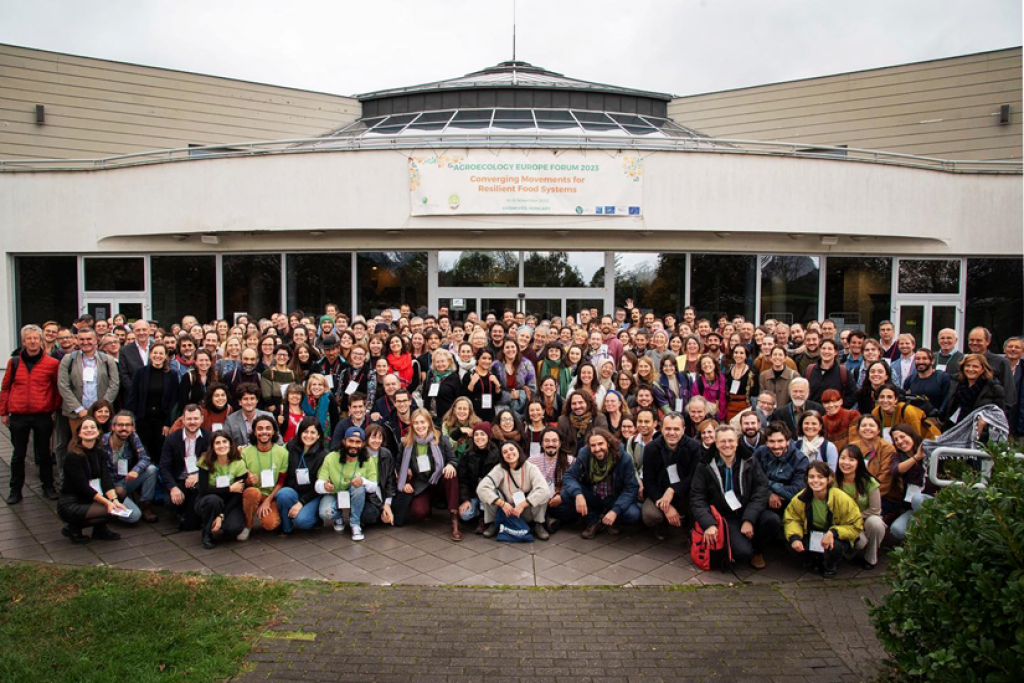Between 16 and 18 November the Agroecology Europe Forum took place in Gyöngyös near Budapest. This 3-day in-person event was organized by Agroecology Europe, a non-profit organization which promotes agroecology and intends to place agroecology high on the European agenda for sustainable development of farming and food systems. The event brought together nearly 300 people from 36 countries (26 European countries and 10 outside Europe) for dynamic and interactive dialogues around key European policy issues. By bringing together a variety of stakeholders, including 37 Civil Society Organization (CSO) representatives and 35 farmers, from various movements and territories, the event aimed to create synergies that set an exemplary model for facilitating the agroecological transition in Europe while acknowledging the global reach of the movement.
The meeting provided an opportunity for a team from the Agroecology-TRANSECT project to share their work and connect to the broader Agroecology movement at European scale. In the session on the role of networks in scaling out agroecology, Raquel Luján Soto (CSIC, Spain) presented first results of the work she carried out to identify all actors involved in the movement part of agroecology in Europe. Focusing on their narratives, her presentation was entitled “Discourses of key European actors of civil society involved in agroecology”. Looking at the different frameworks and definitions of agroecology, this presentation addressed the opportunities and risks of relying on the different frameworks (Nyéléni Declaration, High Level panel of Expert of the FAO), and definition for Agroecology as a Social Movement. A workshop was organized by a team including Adrien Swartebroeckx (CRA-W, Belgium), Darleen van Dam and Walter Rossing (WUR, Netherlands), Bertrand Dumont (INRAE, France), Alexandra Waldmann (Čarna, Slovenia), Raquel Luján Soto (CSIC, Spain) and Csillag Bittermann (ÖMKi, Hungary). The workshop took the Horizon Europe Agroecology-TRANSECT project as point of departure to discuss novel ways of connecting knowledge of practitioners and scientists in multi-actor projects that aim for a change towards agroecology. In particular, the question was addressed how to effectively organize innovation-oriented research projects as interventions in complex socio-technical change processes. Four appetizer presentations regarding the project objectives, our co-innovation approach, the Slovenian Innovation Hub learning history, and an example of mapping methodology set the scene for the workshop. Then, a large part of the Workshop was dedicated to exchange between the participants in a World Café activity, mixing them and their ideas in different discussion tables with three main topics:
· Why engage in a multiactor project?
· What is needed to produce actionable knowledge?
· How to feed the agroecology movement?

The discussion tables gave way to a wide range of interesting exchanges. When discussing the first theme about multi-actor projects, participants agreed on the benefits of having different perspectives in these projects. They emphasized the importance of driving change with a multitude of actors. The discussion also highlighted a critical gap in transdisciplinary education and research, suggesting that collaborative efforts between different disciplines are essential for addressing the complex challenges facing agriculture. Another notable aspect discussed was the challenge of getting farmers to engage voluntarily for extended periods, revealing the struggle to showcase the direct benefits of such involvement. For small farmers and CSOs, the interest of joining multi-actor projects is to make their voices heard by researchers, decision-makers and the dominant players in the agricultural sector.

Discussing second theme, participants highlighted that producing actionable knowledge relies on key preconditions: trust and respect among collaborators, understanding historical contexts, and addressing funding gaps for this type of knowledge. Furthermore, while scientists are mostly rewarded by showing results in papers, there is less academic reward for the engagement with practitioners, which makes it difficult to concentrate on the needs of the practitioners and citizens. They pointed out the importance of thinking together with farmers mentioning for example field level demonstrations, peer-to-peer exchange and Living Labs.
The third theme focused on the “how to” and once more brought the discussion on the link between research and farmers. The bottom-up approach was mentioned as the key to feed the agroecology movement. Participants advocated on-field exchanges, including scientists, adopting a cross-sector approach with bottom-up stories and understanding diverse perspectives with methodologies such as “walk in my shoes”. And finally, one challenge that emerged was the legacy issue, how to feed the movement and be sure that it impacts the future.
The fruitful discussions brought to the table some challenges and issues to be addressed when it comes to connecting researchers and practitioners. But they also provided their share of possible solutions and proposals for the next steps. And even if the agroecological transition is still a long path to walk, we already put in our agenda the next Agroecology Europe Forum to be held in Malmö in October 2025 as one of the next steps.
Credits photo : ASBL Agroecology Europe




